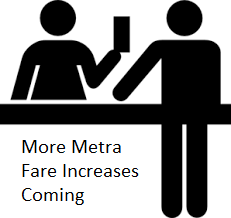Press Release, Nov. 3, 2017
Metra Increases Fares,
Does Nothing to See It Won’t Happen Again Next Year
strategy of imposing them gradually
Citizens Taking Action, an organization comprised of transit dependent riders, offered their comments at the 2018 Metra budget hearing, which took place yesterday at their headquarters.
Metra plans to increase fares by 4.8 percent, and for the first time in its history is cutting train service. Weekday trains will be curtailed or eliminated on three lines, and weekend trains on two lines will be cut from the schedule. Metra is also implementing a number of smaller “efficiencies” to cut costs.
Although Metra has met or exceeded the system’s financial obligations set for 2017, there will be a $15 million shortfall in the amount of funding Metra receives from public sources. Fares typically pay for about half of Metra’s operating costs.
While Metra management maintains that it is making “Difficult Choices” due to “A Perfect Storm” (pages 1-3 of budget), three years ago Metra approved a plan to raise fares by a total 68 percent over a decade, to help upgrade equipment. Metra riders have already seen three consecutive years of fare increases.
The transit group maintains that while Metra unquestionably met with cuts in federal and state support, a fare increase was in the works anyway. In addition, any fare increase in public transit results in reduced ridership, usually around 5 percent, so doing so does not necessarily result in increased revenue for the system.
Charles Paidock, Secretary, stated: “The legislation the three transit systems are depending upon for operating and capital funding was enacted almost ten years ago. Needless to say, times have changed, and perhaps the transit boards ought to collectively look to revising funding mechanisms, instead of relying upon the old standard of increased fares and reduced service. No substantive changes were advanced.”
Pace, the bus service primarily serving the suburbs, plans no service cuts but voted to raise fares by a quarter ($0.25) a ride. The CTA has not yet presented a budget proposal to its board
The RTA Board of Directors will consider the 2018 proposed operating budgets, and five-year capital programs for CTA, Metra and Pace, at its December 14, 2017 meeting. Eight public hearings are scheduled before that to take place on November 28, 29, and again on December 7, 12.
From Citizens Taking Action for transit dependent riders
RTA PUBLIC HEARINGS
2018 Regional Transit Operating Budget, Capital Program and 2018-2023 Regional Transit Strategic Plan
The RTA Board of Directors will consider the 2018 proposed operating budgets and five-year capital programs for CTA, Metra and Pace at its December 14, 2017 meeting. Plan to attend one of the public hearings listed below to share your comments on these items as well as the 2018-2023 Regional Transit Strategic Plan. Check back to RTAChicago.org as more information becomes available in late November.
DuPage County
November 28, 10AM-12PM
Office of DuPage County Board 421 N. County Farm Rd. 1st Floor Auditorium Wheaton, IL
North Cook County
November 29, 4PM-6PM
Village of Arlington Heights 33 Arlington Heights Rd. Commissions Room - 2nd Floor Arlington Heights, IL
South Cook County
November 29, 4PM-6PM
Village of Flossmoor 2800 Flossmoor Rd. Committee Room Flossmoor, IL
Downtown Chicago
November 29, 4PM-6PM
RTA Headquarters 175 W. Jackson Blvd. Suite 1650 Board Room Chicago, IL
Will County
December 7, 10AM-12PM
Will County Office Building 302 N. Chicago St. County Board Room Joliet, IL
McHenry County
December 7, 10AM-12PM
McHenry County Administration Building 667 Ware Rd. Conference Room A - 2nd Floor Woodstock, IL
Lake County
December 12, 10AM-12PM
Lake County Courthouse and Administrative Tower 18 N. County St. Conference Room C - 10th Floor Waukegan, IL
Kane County
December 12, 10AM-12PM
Kane County Government Center 719 Batavia Ave. Auditorium Geneva, IL
Schedule Below


